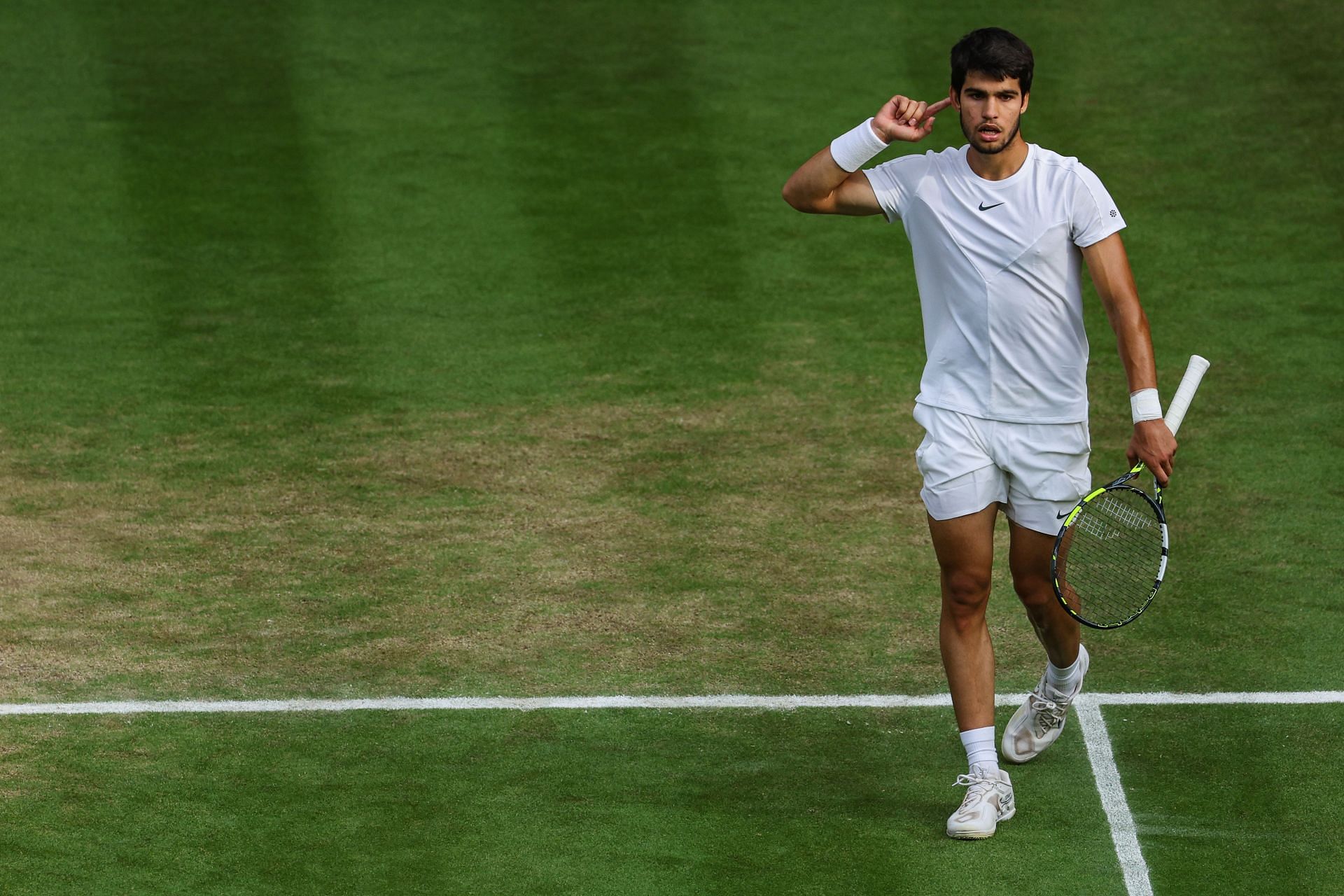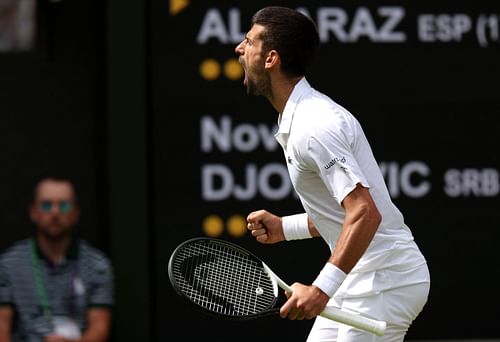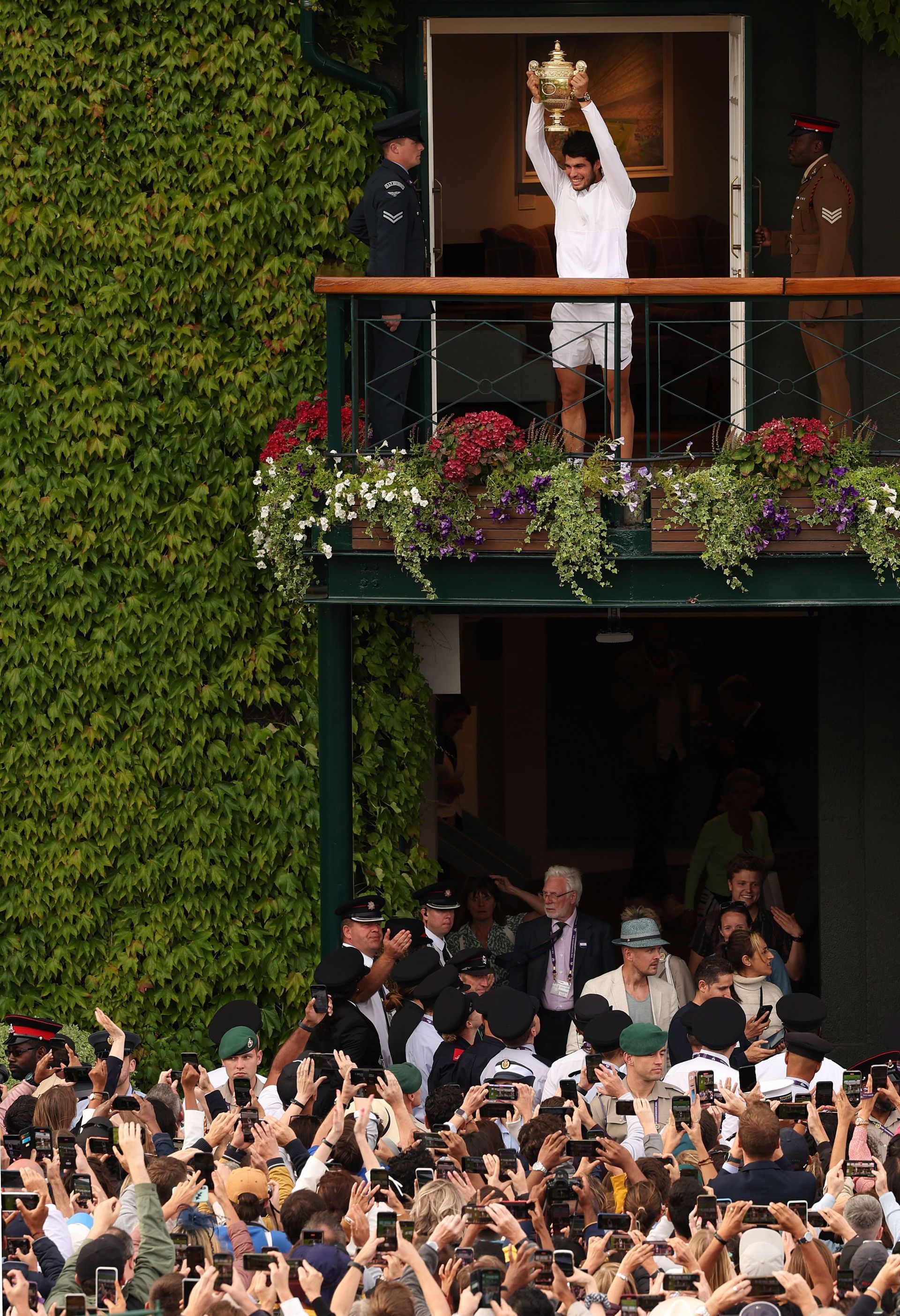
Carlos Alcaraz is here to play; who cares about anything else?
The live stream of the Wimbledon 2023 men's final between Carlos Alcaraz and Novak Djokovic wasn't the smoothest; for a brief while the sound wasn't in sync with the picture, so we could hear the shot before we saw it. We knew in advance Djokovic was going to make those two critical backhand errors (of which there were surprisingly many in the match) in the second set tiebreaker, which was a bit of a bummer.
But when it came to Alcaraz's shots, the lack of synchronization somehow added to the excitement. We knew, when he let out one of those extra-intense grunts, that a particularly enormous missile was about to be unleashed. It was the perfect buildup; we had enough time and warning to prepare for the explosion.
And yet we still jumped out of our seats every time the actual explosion happened. That's just how endlessly astonishing Alcaraz's tennis is.
There has been a lot of talk about the 'changing of the guard' over the last year. It all started when Alcaraz beat Djokovic - in a deciding-set tiebreaker, no less - at Madrid. The conversation picked up pace when the Spaniard usurped the No. 1 ranking by winning the US Open, a tournament that Djokovic was barred from playing. Needless to say, with Alcaraz breaching the Serb's grasscourt fortress on Sunday, things have now reached a crescendo.
Wimbledon was the one place where everybody thought Djokovic was unbeatable. But Alcaraz missed that memo completely. In fact, judging by the way he belted winners for fun in the final, it is entirely possible the only memo he has ever seen in his life is: see ball, obliterate ball.
To my mind though, looking at this result as a changing of the guard is missing the point of Alcaraz a tiny bit. Yes, the Spaniard has been marked out for great things - maybe even historic things - ever since he was 15. But when you look at him play, you don't get the feeling he is playing for history.
The fact that history is created every time he lifts a trophy is incidental. What he is really out to do, is have as much fun on a tennis court as is humanly possible.
In his semifinal against Daniil Medvedev, Alcaraz was cruising so effortlessly that he seemingly tried to make the match closer out of sheer boredom. At 4-2 in the third set, he attempted a tweener that no professional player should ever attempt. The very next point he recklessly rushed the net and promptly missed the volley. Medvedev broke two points later to get back on serve; Alcaraz's showboating almost made the match competitive.
Almost. Such was the gulf in skill between the two players that the break was restored the very next game, ultimately winning Alcaraz the match.
There was no such showboating from the Spaniard in the final against Djokovic, but it still seemed like he was putting on a show. Aside from the first set, where he was struck by a particularly bad case of nerves, Alcaraz played with a freedom and a fervor that I dare say has never been seen on Centre Court.
Pitted against one of Wimbledon's greatest champions and arguably the most machine-like tennis player in history, Alcaraz produced the only counter that could possibly work: completely unshackled genius.
He rushed the net at every short ball he got. He blasted clean winners off well-struck smashes (I'm guessing you've seen this supernatural shot). He hit impossibly angled forehands and backhands that left even Djokovic, the master of angles, shaking his head.
Most stunningly, he reflexed back into play so many of Djokovic's big serves that the Serb managed to win just 62% of his first serve points on the day. That's an unheard-of statistic on grass; how would Djokovic, the best returner in history, have felt at being out-Djokovic-ed so spectacularly on the biggest stage in the sport?

Djokovic being Djokovic, he still almost stole the match out of the redlining Alcaraz's grasp. If he hadn't made those three regulation backhand errors in the second-set tiebreaker (as an aside, what would Federer fans have given for even one of those in the 2019 final?), the match could conceivably have finished in straight sets. And if he hadn't missed that eminently makeable swing volley on break point in the fifth set, he might have broken Alcaraz's spirit for good.
But the volley error - which will likely be replayed a thousand times over the next few weeks - might also have been the biggest sign yet that Alcaraz has already created an 'aura' of his own, the way all great champions do.
Djokovic's backhand two shots earlier in the rally was brilliant; against seven out of 10 players, the point would've ended there. The forehand that Djokovic hit after that was even better; against nine out of 10 players, it would've won him the point. And the volley that Djokovic attempted would've gone crosscourt against 99 out of 100 players; he was close enough to the net to put the ball away once and for all.
But Alcaraz is not just that one out of 100 players; he is one out of a thousand. Aware of the Spaniard's inhuman court coverage, Djokovic tried to wrongfoot him by going for the riskier down-the-line shot.
He couldn't believe it when he netted it, and neither could we. But for Alcaraz, it must have felt like just reward for his relentlessness.
There was more to come though. The game at 5-4, with Alcaraz serving for the title, would've reduced most players to a puddle of nerves. And when the Spaniard hit a terrible drop shot to go 0-15 down, the writing seemed on the wall.
But remember how I said Alcaraz didn't get the memo of Djokovic's Wimbledon invincibility? He certainly didn't see any writings on any walls either.
On the very next point after that awful drop shot, Alcaraz attempted another. This time he not only got it in but also followed it up with a picture-perfect lob winner. The courage to try a shot as risky as that, right after you've bungled one so badly? You can't teach that. For all of the praise that Juan Carlos Ferrero is (rightfully) getting as the man who coached the 20-year-old to the impossible, the drop shot at 0-15 was all Alcaraz.
That game also saw an incredible volley which gave him a 30-15 lead, and it ended with another piledriving forehand that even Djokovic couldn't get back in play. Even 10 years from now, when anyone tries to advise a youngster on how to serve out a high-stakes match, they'll point to the game that Alcaraz played at 5-4 to win the biggest win of his life. It was, there's no other word for it, iconic.
After a display like that, the temptation to call Alcaraz the new 'Big One', the one-man army who will inherit the Big 3 mantle, is stronger than ever. But as always, it is advisable to temper the hype with some caution.
Djokovic, it has to be said, was poor on Sunday by his standards. Those backhand misses in the tiebreaker were among 40 unforced errors he made on the day overall, and if you adjust for Wimbledon's famously lenient scoring system, that number was probably in the 60s.
He also refused to change his serving strategy despite the lack of free points he was getting off it. And his inability to put to bed that insane 26-minute game in the third set, despite having numerous chances to do so, has got to rankle.
Despite all of that, it still took Alcaraz everything he had to pull out the win. And lest we forget, Djokovic is still the champion at 66% of the Slams this year. Just five weeks ago, on his worst surface, he outlasted the 20-year-old in a way that nobody else on tour has been able to.
The Serb is not going anywhere, despite his age and his subpar Wimbledon performance. If anything, he might be more motivated than ever to win the US Open and get revenge - in tennis terms as well as vaccination mandate terms.
There could also be other things that go wrong for Alcaraz on the path to immortality that everyone now expects him to tread. He could be beset with injuries (God knows his playing style is not kind to the body), he could struggle with motivation, he could have to deal with his own kryptonite opponent (Jannik Sinner and Holger Rune are already threatening to become that, although the latter was dealt with easily at Wimbledon).
So why put an added burden on him - and on ourselves - by making predictions about his Slam tally or his eventual place in the pantheon of all-time greats?
Sure, it doesn't help when Djokovic says things like Alcaraz has got the best elements of every Big 3 member. Or that he "hasn't ever played a player like him." But look a little closer, and Djokovic's words tell us something that no amount of statistics or predictions can: that Alcaraz the player alone is a spectacle worth celebrating.
Last year I was in the stands when Alcaraz took on Jack Draper in the Basel round of 32. Alcaraz was far from his best in that match and made a bunch of elementary errors in both the first and the third sets. But the crowd, which looked like a full house, didn't mind one bit. That's because when Alcaraz did come up with the goods - a buttery smooth volley winner here, a muscly forehand bomb there - it was enough to wipe out the bad memory of every single error.
By the end (Alcaraz broke late in the third set to win 7-5), the spectators were chanting his name in unison. The sounds reverberated all around the closed arena like they would at a rock concert, and when the Spaniard sealed the deal on match point and turned to the adoring crowd, he looked like he was channeling Daenerys Targaryen after one of her dragon conquests.

It was the same and more after his US Open win last year, and again after his Wimbledon triumph on Sunday. When Djokovic's last forehand found the net and Alcaraz fell to his back, the Centre Court crowd rose as one to mark the coronation of the player that had so thrillingly entertained them for close to five hours, and so completely owned the big stage against the biggest big-stage player in history.
Carlos Alcaraz may be the future of tennis, or he may not. But he is definitely the present, the here and now, and we'd be doing ourselves a disservice by focusing on anything other than his one-of-a-kind game.
So what if we don't live to see him win 25 Slams? We've lived long enough to see him do his thing on Centre Court, and that is enough of a flex.